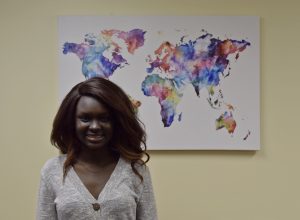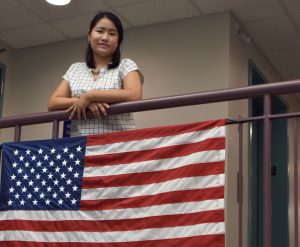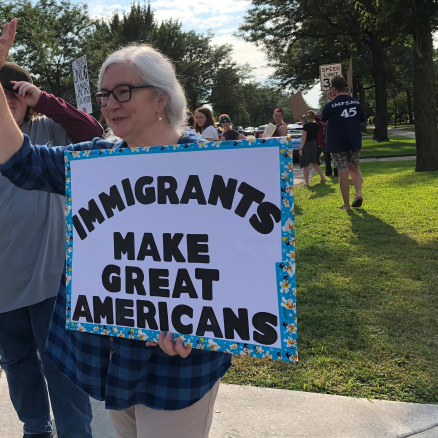Archives
Ten Things You Can Do to Support Immigrants and Refugees
In 2021, the struggle against racism and xenophobia continues. What can each person do to support immigrants and refugees during this time of change? Some people want to march, others find public protest intimidating. Some of us have a little cash to donate, others do not. Maybe writing a letter to the editor is more your style. We have updated our list of important ways to help, hoping that everyone can find some way to join in.
1) Get informed. Follow us on Facebook for the latest immigration news. If you click and read just one article a day, you’ll be better informed than most people, and better able to respond to ignorant attacks.
2) Speak up and speak out. Talk to friends and family, and to members of your civic and religious groups about immigrants and refugees. (Check out our Tips for Talking About Immigration for help getting started.)
3) Write letters to the editor to your local newspaper. Every letter that is published lets others know that immigrants and refugees have our support.
4) Support organizations that provide direct services to immigrants and refugees. Yes, that includes us! Some other Minnesota organizations: Advocates for Human Rights, Immigrant Law Center of Minnesota, International Institute of Minnesota, Clues, Mid-Minnesota Legal Aid, and Volunteer Lawyers Network. Nationally, some good places doing good work include RAICES (legal assistance in Texas); KIND (Kids In Need of Defense); Catholic Charities Refugee and Immigration Services in Portland, Maine; San Diego Rapid Response Network (donate directly or buy from their Wish List), and Al Otro Lado, which works on both sides of the border.
5) Call your representatives. Changing national policy is the single most important way to help immigrants and refugees. That is not something that will happen overnight, but it can and must happen. Pick one thing each week, and put a reminder on your calendar to call every week. Tell them you want support, not detention, for asylum seekers. Tell them you support a path to legalization and citizenship for all immigrants set out in the U.S. Citizenship Act of 2021. Tell them you want a country that welcomes the contributions of immigrants. Put their numbers on your speed dial or reach them through the Capitol switchboard at (202) 224-3121.
Phone calls get more attention than letters, which get stuck in security screening for weeks or months. Petitions get almost zero attention.
Here’s a link to our Action Alert page, which is updated regularly.
6) Get immigrants out of detention. Contribute to bond funds. Someone who is out on bond has a much better chance to get an attorney, gather evidence, and put together a successful defense against deportation. The lowest bond is $1,500, but these days the government is getting judges to set much higher bonds. In Minnesota, contribute to the Minnesota Freedom Fund.
7) Join with others. Go to a rally or protest, invite friends over to watch a movie about refugees, take a friend to a benefit event—commitment shared brings strength and energy for the struggle.
- Every Tuesday morning, from 7:30 to 8:30, people gather at the ICE entrance to the Bishop Henry Whipple Federal building to protest the continuing detention of immigrants, here and at the border
- Every day: Stand on any street corner any time with a sign opposing immigrant detention camps
8) Share on social media. You are an influencer: tell your friends what you think and that supporting immigrants and refugees is important to you. Share current news articles from our Facebook page to fight back against the lies about immigrants and refugees.
9) Volunteer. Help people learn English. Provide pro bono legal services. Become a court watcher in immigration court.
10) VOTE! Changing national policy is the single most important way to help immigrants and refugees. That is not something that will happen overnight, but it can and must happen.
[The post originally published as “Five Things You Can Do to Help Immigrants and Refugees” and most recently updated in January 2021.]
Melissa Pfeiffer Named One of the Top Women in Finance by Finance & Commerce Newspaper
This award recognizes the efforts of 36 women who make notable contributions to their professions and communities. As Associate Director of the Immigrant Law Center of Minnesota (ILCM), Melissa Pfeiffer oversees planning, development, finance, IT, and human resources for the nonprofit legal assistance organization.
Pfeiffer will be recognized at an awards ceremony dinner attended by more than 450 people on Thursday, November 21, 2019 at the Hyatt Regency in Minneapolis.
“I’m honored to be recognized by Finance & Commerce,” said Pfeiffer. “For ILCM, success means serving our clients and the community. In nonprofit organizations, as much as in businesses, responsible management and oversight are crucial to success.”
“We are happy to see Melissa honored for her outstanding work,” said Veena Iyer, executive director of ILCM. “As associate director, her work includes finance and much, much more. She is essential to keeping this organization running and serving the community.”
The Immigrant Law Center of Minnesota (ILCM) is a nonprofit agency that provides immigration legal assistance to low-income immigrants and refugees in Minnesota, with offices in St. Paul, Moorhead, Worthington, and Austin. ILCM also works to educate Minnesota communities and professionals about immigration matters, and advocates for state and federal policies which respect the universal human rights of immigrants. https://ilcm.org
Minneapolis-based Finance & Commerce, which publishes Tuesday through Saturday, focuses on commercial real estate, construction, economic development, regional planning, transportation and transit. Its corresponding website, www.finance-commerce.com, is updated daily with the latest news and data. Finance and Commerce Inc. is also the publisher of twice weekly Minnesota Lawyer. Website: https://finance-commerce.com/
New Fees Create Impossible Bar for Many Immigrants
UPDATED December 7, 2019—In its latest move to keep immigrants out, the Trump administration now plans to increase fees and eliminate fee waivers for most immigration applications. These plans include—for the first time—a fee for asylum. Adding insult to injury, increased fees will help to fund enforcement, rather than being reserved to pay for processing the applications for which the fees are paid.
“Charging a fee to asylum seekers is particularly heinous,” said Veena Iyer, executive director of the Immigrant Law Center of Minnesota (ILCM). “The asylum officer who called this fee ‘blood money’ got it exactly right.”
| Benefit | Current Fee | Proposed Fee | Net Difference | % Change |
| Asylum | 0 | $50 | $50 | N/A |
| DACA | $495 | $765 | $270 | 55% |
| Lawful Permanent Residence | $1,225 | $2,195 | $970 | 79% |
| Naturalization | $640 | $1,170 | $530 | 83% |
Moreover, fee waivers—which have long been accepted and granted for a wide variety of immigration benefits—will be eliminated for all applicants except for five categories of crime, abuse, and trafficking victims protected by specific statutes that USCIS cannot change.
“Working with low-income immigrants every day, ILCM attorneys see their passion for citizenship and the enormous contributions they make to this country,” said Iyer. “These fee increases and the elimination of virtually all fee waivers betray the ideals and values of this country.”
The increased fees were announced last week and published in the Federal Register on November 14, with a 30-day comment period before they go into effect, half the normal comment time. UPDATE: On December 6, the comment period was extended to December 30.
You can resist the fee increase by submitting a public comment to the Federal Register and by contacting your Congressional representatives to ask them to act to preserve fee waivers for all low-income applicants.
Attorneys and Advocates Speak to Reporters After DACA Oral Argument
MN DACA Recipient shares her story in light of Supreme Court discussions
DACA recipients in Minnesota follow court arguments, wait for resolution
DACA in the Supreme Court and Beyond
November 12, 2019 – Today, the U.S. Supreme Court heard arguments regarding the legality of the termination of the Deferred Action for Childhood Arrivals’ (DACA) program. Lower courts have uniformly concluded that the termination of DACA was unlawful. The Supreme Court’s decision is expected by the end of its term in June 2020.
Whatever decision the Supreme Court makes, DACA recipients need a secure path to permanent residence and citizenship. Congress must act to create that path.
At today’s oral argument, the government contended that the decision to end DACA was not subject to judicial review. They also argued that the administration’s reasons for ending DACA were sound. The plaintiffs—who included DACA recipients, several states, and social justice organizations—responded that the Court undoubtedly had jurisdiction to review the termination of a program upon which hundreds of thousands of young Dreamers had relied. The plaintiffs also pointed out that the administration’s stated reason for ending DACA—that the program is illegal—was incorrect and inadequate.
The Court’s decision could take a number of paths. The Court could conclude that it lacks authority to review the termination of DACA or determine that the decision to do so was permissible, both of which would result in the end of DACA. On the other hand, the Court could decide that the decision to end DACA was unlawful, which would result in DACA continuing for current recipients—and possibly even being available to new recipients—if and until the administration provides a proper justification for rescinding the program.
“ILCM worked hard to see DACA take effect, and we continue to defend the Dreamers of today and tomorrow, by conducting outreach, assisting current DACA recipients with renewals, and signing on to a friend-of-court brief submitted in the Supreme Court case,” said Veena Iyer, executive director of ILCM. “As of August 2018, 5,670 Minnesotans had received DACA status. They are our family, friends, neighbors, classmates, colleagues, classmates, teachers, doctors, and lawyers. The administration should not be permitted to evict these Dreamers from the only home they have ever known. Congress must act to give them permanent protection. Their home is here.”
New applications for DACA are no longer being accepted, but renewal applications are still being processed. ILCM urges individuals who have been granted DACA to renew their DACA status. Persons living anywhere in Minnesota can call ILCM at 651-641-1011 or 1-800-223-1368 to schedule an appointment.
Highlighting Immigrant Stories in Austin, Minnesota
More than 10% of Austin, Minnesota residents are immigrants. Recently, we talked to three ILCM clients in Austin about their experiences of immigration and the United States.
Layiet is a student at Riverland Community College. Her family is from Gambela, Ethiopia, though she was born in South Sudan. She and her family came to the United States as refugees when she was around five years old, and she grew up with a good understanding of both American and African cultures.

At home, Layiet speaks her native language and is immersed in Ethiopian culture. But “[w]hen I leave my house,” she says “it’s like I’m a different person than I am at home.” Layiet explains, “everything American culture, I have to be immersed in it.”
Once she has finishes her studies, Layiet hopes to go back to Ethiopia. “I went to America for opportunity, to learn how to do things and then take [those skills] back home,” she said. “America doesn’t need me because it’s already a first world country. If I don’t go back and help, who will?”
“The life I’m living right now,” Layiet says, “I’m living for me and my mom because she didn’t have this opportunity. I’m blessed to be in this position because most people don’t get this opportunity and I want to use it to help others.”
Originally from Burma (Myanmar), Thatcher spent time in a refugee camp in Thailand before coming to the United States. Speaking of her time as a refugee, Thatcher says she didn’t have freedom or a place to call home. While in the camp, she applied several times to go to Finland, where her sister lived, but it never worked out. “I guess God wanted to bring me here,” she said.
She heard about the Immigrant Law Center of Minnesota (ILCM) from her husband. Thatcher had known her now-husband in the refugee camp, though they didn’t talk to each other. “He was my crush,” she said with a laugh.
When Thatcher wished to become a citizen, her husband introduced her to ILCM. ILCM Staff Attorney Sara Karki remembers having to inform an eager Thatcher that she had to live in the United States for a few more years to be eligible for citizenship. Once that time had elapsed, Thatcher returned with her husband and child, and Sara assisted the family to become citizens.

“After I became a U.S. citizen, I felt so great,” Thatcher said, “I’m so happy it’s my home and my country!” She registered to vote at her naturalization ceremony and is excited to vote in the future. She is also looking forward to being able to travel abroad now that she is a citizen. “I am more than blessed to be an American citizen,” she said. “I know I am free and I am in a place where everybody is being treated fairly with equal rights. I thank God for not just putting me in a safe place, but for putting me in a place where I can call home.”
Ninn came to the United States after living in a refugee camp in Thailand. “We didn’t have a future there,” Ninn said of the camp. “[We could only] do work today, and spend money today—we were poor, and had no opportunity, nothing to dream for.” Coming to the United States gave Ninn “a new perspective” on life.
Since arriving in the United States six years ago, Ninn has graduated from Riverland Community College. She now works as a success coach for Austin Public Schools. “I’m doing the job that I love,” she said. “It’s just the most amazing thing when you’re doing the thing you love and helping people.”
Ninn also recently became a citizen, which she considers the best moment of her life. She said that at her naturalization ceremony, “[e]veryone had a big smile on their face—including me!” In the future, Ninn is interested in being a nurse or a teacher. “I want to do a job that makes me happy and also lets me help others, especially anyone who is in need,” she said.





